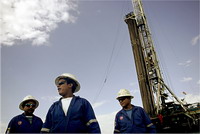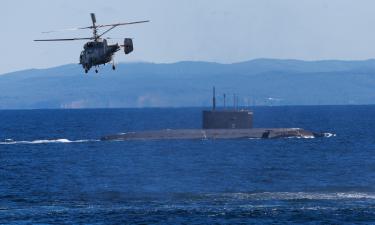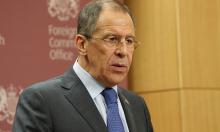President Rafael Correa's decree slashes profits from operations of foreign oil companies in Ecuador
Foreign oil companies reacted to a surprise decree from President Rafael Correa that slashes profits from their operations in Ecuador.

Oil industry analysts said Correa was taking advantage of his recently strengthened political position by shunning negotiations and issuing the decree, which came just days after the leftist president's party won a vote for a new assembly to rewrite the constitution.
Correa, who won office in 2006 on promises to boost state oil income and spending on the poor, has sharpened his populist rhetoric this year, pushing the contentious constitutional reform process and striking oil refining deals with Venezuelan ally, President Hugo Chavez.
Representatives of at least six foreign oil companies failed to appear Monday at a meeting with energy ministry officials. The government had called the meeting before the decree announcement to review contracts signed with the state since 1996.
"They've told me that they have to consult with their headquarters," said Energy Minister Galo Chiriboga. Company representatives declined comment Monday.
In the surprise decree issued Thursday, Correa nearly doubled his government's share of foreign oil companies' "extraordinary earnings," or earnings on oil sold above prices fixed in company contracts, boosting state royalties from 50 to 99 percent.
Assuming oil prices remain near current levels, the move will increase government income by US$69 million (49 million EUR) per month starting in November, and by US$828 million (588 million EUR) a year.
Ecuador's former economy minister Mauricio Pozo said he saw last week's decree as driven by Correa's desire to make a strong statement about how he will deal with foreign oil companies.
"I don't have the slightest doubt that this is a decision to prove his strength," Pozo told The Associated Press. "He could have achieved the same result in a one-on-one renegotiating process, but he opted for a more radical mechanism."
The companies most affected by Correa's decree include: U.S.-based City Oriente, the Argentine-Spanish company Repsol YPF, Brazilian state oil company Petrobras, French-owned Perenco SA, and the Chinese company Andes Petroleum Corp.
Contracts those companies signed during the 1990s assumed average oil prices of US$25 to US$30 per barrel. Ecuadorean crude, the country's largest export, now sells for $61 a barrel.
Correa has challenged that windfall, questioning why the state should not benefit more from soaring world oil prices.
"In principle, this is a fair decision," Simon Pachano, a professor at the Latin American Faculty of Social Sciences in Quito, said of Correa's decree. "The problem is in the way they've done it," without negotiating.
In the past, Ecuador has been "very weak, very scared of the consequences" of negotiating with foreign oil companies, Pachano said. "Now they're taking a firm measure, and it seems a radical decision."
Subscribe to Pravda.Ru Telegram channel, Facebook, RSS!




